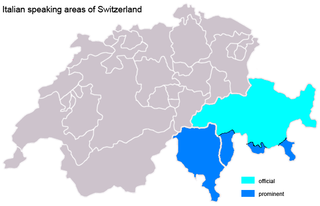Swiss Italian
| Swiss Italian | |
|---|---|
| dialetto svizzero | |
| Native to | Italian Grisons, Switzerland |
| Ethnicity | Swiss Italians |
Native speakers | 720,000 (2019 census)[1] |
Indo-European
| |
| Official status | |
Official language in | Switzerland |
| Language codes | |
| ISO 639-3 | – |
| Glottolog | None |
 | |
| This article is part of the series on the |
| Italian language |
|---|
| History |
| Literature and other |
| Grammar |
| Alphabet |
| Phonology |
The Italian language in Switzerland or Swiss Italian (Italian: italiano svizzero) is the variety of the Italian language taught in the Italian-speaking area of Switzerland. Italian is spoken natively by about 700,000 people in the canton of Ticino, in the southern part of Graubünden (Canton Grigioni) and in the rest of the country.[2]
Characteristics
The presence of calques from French and German means that there are some differences in vocabulary between the standard registers of the Italian language used in Italy and Switzerland. An example would be the words for driving licence: in Italy, it is called a patente di guida but in Swiss Italian, it becomes licenza di condurre, from the French permis de conduire. Another example is the interurban bus: in Italy it would be autobus or corriera but in Switzerland, it is the Autopostale or posta since nearly all interurban lines are run by a subsidiary of the Swiss Post.[citation needed]
Another notable difference is the use of the word germanico to refer to German people, instead of tedesco.[3] However, as in Italy, the word tedesco is used to refer to the German language.[4] In Italy, the word germanico is used in the same sense as the word "Germanic" in English, referring, for example, to Germanic languages in general.[5]
Radiotelevisione Svizzera di lingua Italiana is the main Swiss public broadcasting network in the Italian speaking regions of Switzerland. The University of Lugano is the major university of the Italian speaking part of Switzerland.
There are almost no vocal differences between Swiss Italian and mainland Italian. The phonology is very similar to Romansh and Lombard languages.
Examples
Some examples of Ticinese words that are different from Italian are:
| Swiss Italian | Italian | English Translation | Notes |
|---|---|---|---|
| azione | promozione, offerta speciale | special offer, sale | from German Aktion |
| comandare | ordinare | to order (i.e. in a restaurant, bar, etc.) | from French commander |
| evidente | facile | easy | from French évident |
| grippe | influenza | flu, influenza | from both German Grippe and French grippe |
| medicamento | medicinale, farmaco | drug, medicine | from French médicament |
| licenziato | laureato | graduated (from a university) | false friend: in Italian licenziato means dismissed from a job, fired |
| messa a giorno | aggiornamento | update | from French mise à jour |
| nota | voto | grade (accomplishment in school) | false friend: in Italian nota means school reprimand, notice or note (music) |
| pigione moderata | equo canone | rent control | from French loyer modéré |
| riservare | prenotare | to book, reserve | from French réserver |
| vignetta | bollino, contrassegno | tag (a label to exhibit, typically in a car) | from French vignette |
As may be seen from this table, as well as the case with the driving licence described above, Swiss Italian has fewer false friends with English than standard Italian does, as calques from French in Swiss Italian match Latin-origin words in English more often than the Standard Italian words do.[ambiguous]
See also
- Languages of Switzerland
- Italian immigration to Switzerland
- Italy–Switzerland relations
- Swiss French
- Swiss German
- Swiss Standard German
- Ticinese dialect
References
- ^ Discover Switzerland – Language – facts and figures
- ^ "Languages". Federal Statistical Office. 2020. Retrieved 2022-07-07.
- ^ Donna morta a Muralto, un fermo, RSI, 9 April 2019
- ^ Lingue nazionali, si parla di meno in tedesco e italiano, La Regione, 28 March 2018
- ^ Tedesco o Germanico?, La Repubblica, 11 February 2016

